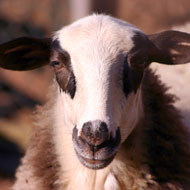Sheep ‘can be trained to recognise faces’

Sheep are considered a good animal model for studying Huntingdon’s disease.
Sheep can be trained to recognise faces from photographs and are able to identify pictures of their handlers without training, according to new research.
Scientists at the University of Cambridge say they managed to train eight sheep to recognise four celebrities (Fiona Bruce, Jake Gyllenhaal, Barrack Obama and Emma Watson) from photos displayed on computer screens.
Sheep are social animals that can recognise other sheep as well as familiar humans, yet little is known about their ability to process faces.
Lead author Professor Jenny Morton, said: “Anyone who has spent time working with sheep will know that they are intelligent, individual animals who are able to recognise their handlers. We’ve shown with our study that sheep have advanced face-recognition abilities, comparable with those of humans and monkeys.”
During training, two photographs were displayed on computer screens at one end of a specially designed pen. The sheep received a food reward each time they chose a photo of the celebrity, but if they chose the other photo, a buzzer went off and they did not receive a reward.
After training was complete, sheep were shown a photo of the celebrity’s face and one of another face. In this test, sheep chose the celebrity’s photo eight times out of 10.
To test how well the sheep recognised the faces, researchers then showed them the faces at an angle. Their performance dropped by only 15 per cent, which is comparable to that seen when humans carry out this task.
Finally, the researchers randomly interspersed a photograph of the sheep’s handler in place of the celebrity. They found the sheep chose a photograph of their handler over the unfamiliar face seven times out of 10, despite the fact that they had never seen a photograph of their handler before. Interestingly, the team said sheep did a ‘double take’ on seeing a photograph of their handler for the first time.
Owing to their longevity and relatively large brains, sheep are considered a good animal model for studying Huntingdon’s disease, which affects more than 6,700 people in the UK. It is an incurable neurodegenerative disease that initially affects motor coordination, mood, personality and memory, as well as impaired recognition of facial emotions.
Prof Morton’s team recently began studying sheep that are genetically modified to carry the mutation that causes Huntingdon’s disease.
She added: “Our study gives us another way to monitor how these abilities change, particularly in sheep who carry the gene mutation that causes Huntington’s disease.”



 The RCVS has announced a new version of its 1CPD mobile app, with enhanced features for veterinary surgeons and veterinary nurses to record their continuing professional development.
The RCVS has announced a new version of its 1CPD mobile app, with enhanced features for veterinary surgeons and veterinary nurses to record their continuing professional development.